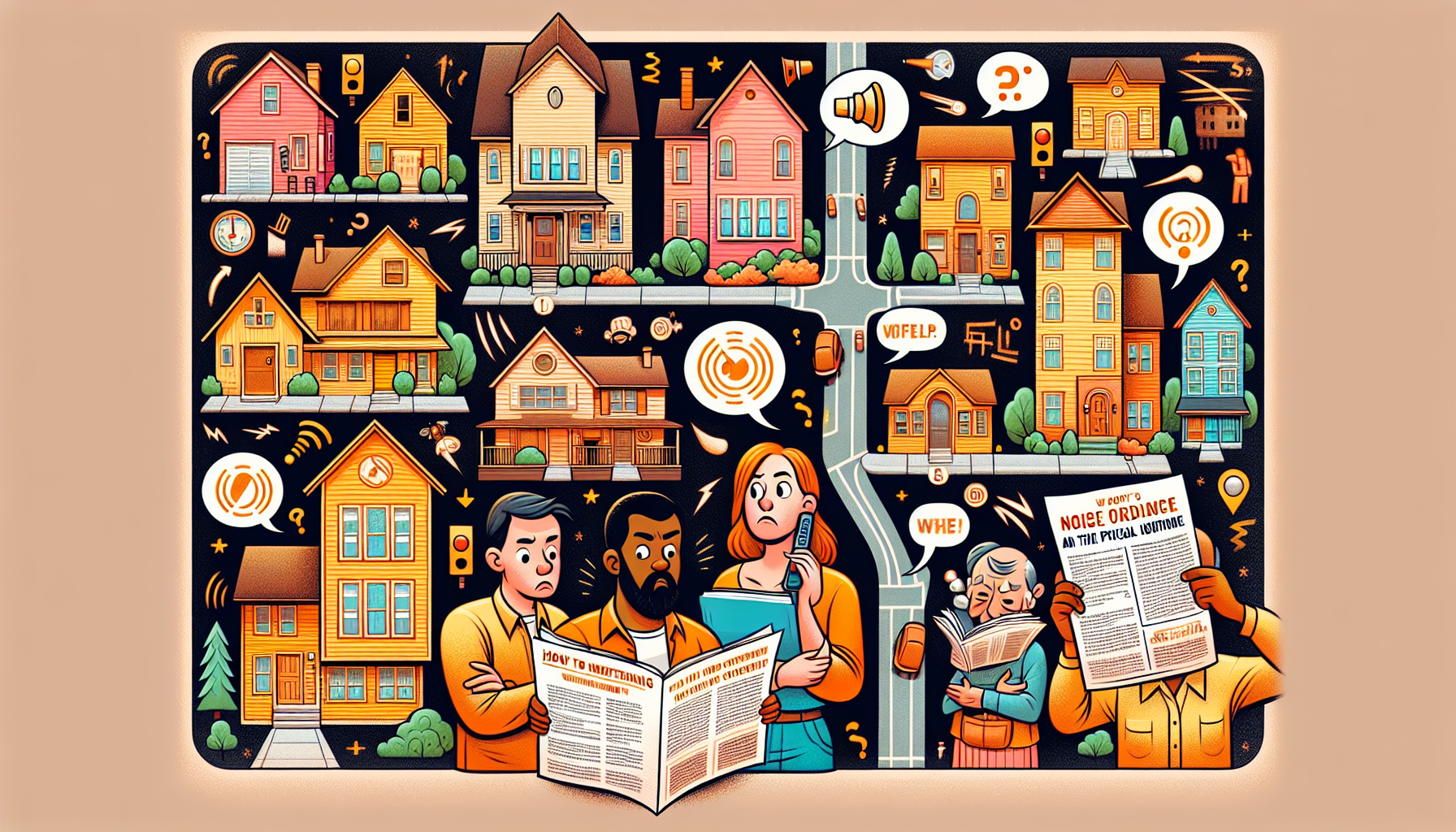 Understanding and navigating Alexandria, VA’s noise ordinance can be essential for maintaining a harmonious neighborhood and avoiding fines or other penalties. Here, we provide a comprehensive guide to help homeowners comprehend and comply with the noise regulations set by the city of Alexandria.
Understanding and navigating Alexandria, VA’s noise ordinance can be essential for maintaining a harmonious neighborhood and avoiding fines or other penalties. Here, we provide a comprehensive guide to help homeowners comprehend and comply with the noise regulations set by the city of Alexandria.### Understanding the Noise Ordinance
#### Definitions:
1. **Noise Disturbance**: Any sound that endangers or injures the welfare, peace, or health of humans or animals, or disturbs a reasonable person with normal sensitivities.
2. **Decibel (dB)**: A unit used to measure the intensity of a sound.
3. **Receiving Property**: The property or environment where the noise is being heard.
### Key Provisions of Alexandria’s Noise Ordinance
1. **General Prohibition**:
- The ordinance prohibits excessive, unnecessary, or unusually loud sounds that unreasonably disturb the comfort and repose of persons.
2. **Maximum Permissible Sound Levels**:
- Residential areas: Noise should not exceed 55 dB during the day (7 AM - 11 PM) and 50 dB during the night (11 PM - 7 AM).
- Commercial and industrial areas have higher permissible limits.
3. **Specific Prohibitions**:
- Loudspeakers, General: It’s illegal to use loudspeakers or amplifiers in public spaces for advertising purposes without a permit.
- Construction Noise: Noise from construction activities is restricted to 7 AM - 6 PM on weekdays and 9 AM - 6 PM on Saturdays. No construction noise is permitted on Sundays and holidays.
- Vehicle Noise: Excessive noise from motor vehicles, including loud car stereos, is restricted.
- Patrons at Establishments: Businesses must control the noise levels from patrons inside or outside their premises.
### Practical Steps for Homeowners
#### Measure and Monitor Noise Levels
1. **Purchase a Decibel Meter**:
- Invest in a quality decibel meter to measure the noise levels around your home. This gives you an objective measure if there’s a potential dispute.
2. **Smartphone Applications**:
- Apps like ‘Sound Meter’ or ‘Decibel X’ can offer reasonable estimates of noise levels.
#### Soundproofing Your Home
1. **Insulate Walls and Windows**:
- Use insulation materials in walls and around windows to minimize sound transmission.
2. **Install Soundproof Curtains**:
- Thick, heavy curtains can absorb sound and reduce the amount of noise entering or leaving your home.
3. **Add Rugs and Carpeting**:
- Carpeted floors can help to dampen noise. Consider using area rugs on hard floors to absorb sound.
#### Managing Household Noise
1. **Be Aware of Your Activities**:
- If you enjoy music, keep the volume at a reasonable level, especially during nighttime hours.
- Be mindful of home appliances like vacuum cleaners, washing machines, and alarm clocks during nighttime.
2. **Communication with Neighbors**:
- Establish good communication with your neighbors. If planning a noisy activity, inform them in advance.
#### Addressing Noise from Neighbors
1. **Polite Conversation**:
- Speak to your neighbor directly and politely about your concerns. They may not be aware of the noise issue.
2. **Mediation Services**:
- Utilize community mediation services to facilitate a discussion if direct communication doesn’t work.
3. **Filing a Complaint**:
- If the noise continues, file a complaint with the city’s Code Enforcement Division.
- Document all instances of noise disturbances with dates, times, and a description of the noise.
### Dealing with Construction Noise
1. **Check Permits**:
- Verify if the construction project has the necessary permits. Permits can specify allowed working hours and conditions.
2. **Speak to the Contractor**:
- Approach the project foreman or contractor directly to discuss your concerns.
3. **Report to Authorities**:
- If the noise persists outside of permitted hours, report it to Alexandria’s Department of Code Administration.
### Handling Business-Related Noise
1. **Engage with Business Owners**:
- Speak to the business owner about your concerns. Many businesses want to maintain good community relations.
2. **Noise Barriers**:
- Suggest practical solutions such as installing noise barriers or limiting outdoor activities.
3. **Formal Complaint**:
- If the issue continues, file a formal complaint with the city. Ensure to document all instances of disturbance.
### Preventing and Resolving Noise from Social Events
1. **Inform Neighbors**:
- If you’re hosting an event, inform your neighbors beforehand and provide them with a way to contact you in case the noise becomes too loud.
2. **Time Limits**:
- Set clear time limits for loud activities. Consider wrapping up noisy parts of the event by 10 PM.
3. **Control Amplified Sound**:
- Keep music and speeches at reasonable volumes, and avoid using loudspeakers outdoors.
### Legal Recourse
1. **Civil Nuisance Actions**:
- If informal methods fail, a neighbor may file a civil lawsuit for a private nuisance in court.
2. **Contacting Law Enforcement**:
- As a last resort, you may contact Alexandria’s Police Department if the noise involves potential criminal activity or immediate threats to safety.
### Proactive Community Involvement
1. **Join or Form a Neighborhood Association**:
- Active participation in your neighborhood association can help address noise concerns collectively.
2. **Community Meetings**:
- Attend community meetings to stay informed about local developments and noise-related issues.
3. **Public Hearings**:
- Engage in public hearings that address noise control policies or local construction projects.
### Utilizing City Resources and Services
1. **City’s Noise Regulation Information**:
- Be familiar with the city's published noise regulations available on Alexandria’s official website.
2. **Noise Control Program**:
- Utilize the city’s Noise Control Program which aims to address chronic noise issues through enforcement and education.
3. **City Council**:
- Voicing your concerns to the City Council can lead to legislative changes if current ordinances are inadequate.
By following these practical steps and utilizing available resources, homeowners in Alexandria, VA can effectively navigate the noise ordinance, ensuring a peaceful and cooperative living environment.
Comments
Post a Comment